Xylitol: The Artificial Sweetener That Can Be Fatal to Dogs
Xylitol is an artificial sweetener used in many sugarless gums and candies, and unfortunately it can be fatal to dogs. And sadly since it’s still used in many products, the number of animal poisonings continues to increase.
The number of cases animal poison control centers handle has substantially increased. In 2014, the Pet Poison Helpline had 2,700 cases involving xylitol or products in which xylitol was suspected. – VPI Pet Insurance
Unfortunately xylitol is used in a wide variety of food products, but there are some ways to cut down on the risk of exposure to your dog. Here’s 5 things to know about xylitol and your dog.
1. Small Quantities of Xylitol Can Be Fatal to Dogs
Xylitol can be fatal to dogs, and it only takes a very small quantity to do serious damage. The signs toxicity can occur in as little as 15 minutes. If you suspect your dog has ingested xylitol call your veterinarian immediately.
The dose of xylitol that can cause hypoglycemia in the dog has been reported between 50 milligrams (mg) of xylitol per pound of body weight (100 mg per kg). The higher the dose ingested, the more the risk of liver failure. The most common source of xylitol poisoning that Pet Poison Helpline gets called about comes from sugar-free gum. – VCA Animal Hospitals
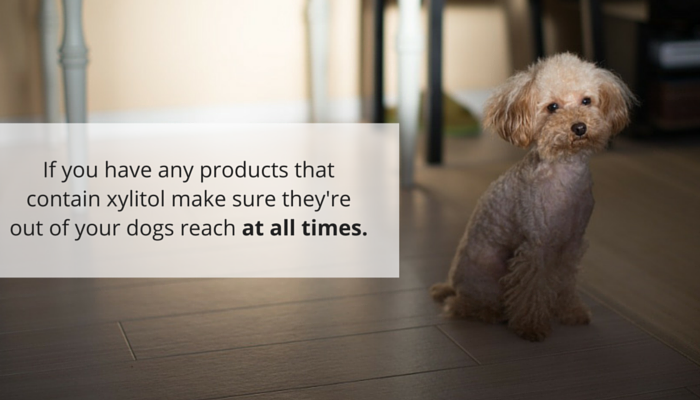
If you keep gum or candy in your purse make sure it’s out of your dogs reach at all times.
2. Xylitol Is Found in a Wide Range of Products
Xylitol is used in a lot of various products from chewing gum to dental care products. The safest way to prevent an accidental poisoning is to check the labels yourself.
Go through all your gum, candy & “sugar free” foods. If you find any items that contain xylitol make sure they’re out of your pets reach.
Xylitol can be found in many over-the-counter drugs such as chewable vitamins and throat lozenges and sprays. It can also be purchased in bulk bags for use in home baking. These products are intended only for human use. – The Food & Drug Administration
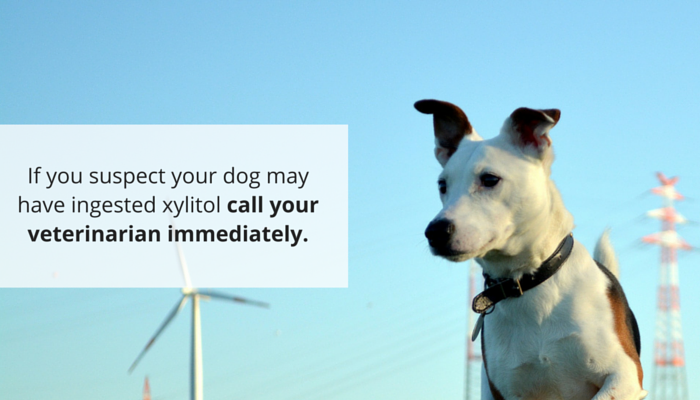
Xylitol poisoning in dogs is a medical emergency, it can cause serious damage (or death) if not treated promptly.
3. Products That May Contain Xylitol
There’s a wide variety of products that contain xylitol, with gum and candy being the most common. Here’s a list of products that may contain xylitol:
- Chewing Gum
- Peanut Butter
- Candies
- Baked Goods
- Children’s Vitamins
- Breath Mints
- Couch Syrup
- Toothpaste
- Mouthwash
- Prescription Medications
- Sugar Free Snacks
4. Brands Known to Contain Xylitol
Here’s a list of brands that are known to use xylitol in their products:
- Icebreakers Gum
- Orbit Gum
- Trident Gum
- Nicorette Gum
- ACT Mouthwash
- Allegra (children’s oral suspension)
- Jell-O Sugar Free Snacks
- Nuts N More
Here’s a bigger list of products & brands by category of items that contain xylitol, but it’s not 100% comprehensive so remember to check labels yourself. If you have any items that contain xylitol in your home make sure they’re out of your pets reach at all times.
Xylitol, a sugar compound sourced from the Birch tree, has been recently discovered to be 100 percent lethal to dogs. In many cases, the quantity of Xylitol-containing food was small––as in a box of sugar-free Tic-Tacs (really), a Jell-O sugar free pudding snack or one sugar-free cupcake. – PetMD
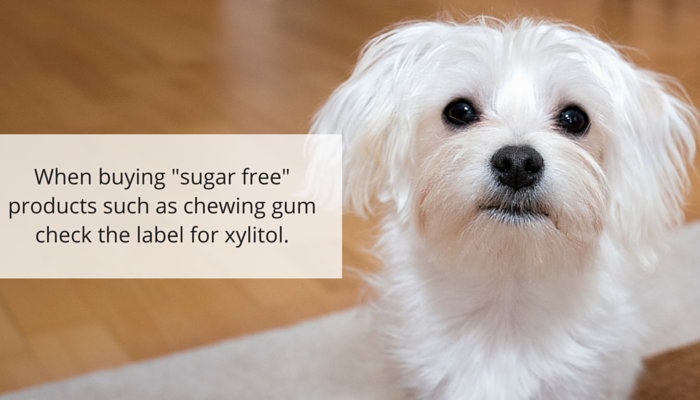
Start reading labels on “sugar free” food items and stick to the ones that don’t contain xylitol.
5. Tips to Keep Your Dog Away from Xylitol
Here’s 5 tips to help cut down on the the risk of your dog being exposed to xylitol:
- Only use pet toothpaste when brushing your dogs teeth
- Keep gum & candies up on tall shelves/cabinets
- Don’t share any baked/sweet goods with your pet
- If you have gum in your purse keep it far out of reach
- Restrict your dogs access to the garbage (use one with a lid, hide it under the sink)
The best way to prevent an accidental poisoning by keeping xylitol containing products out of your home. When you’re shopping start checking the labels on anything labeled “sugar free,” especially chewing gum. There are many xylitol free options available.
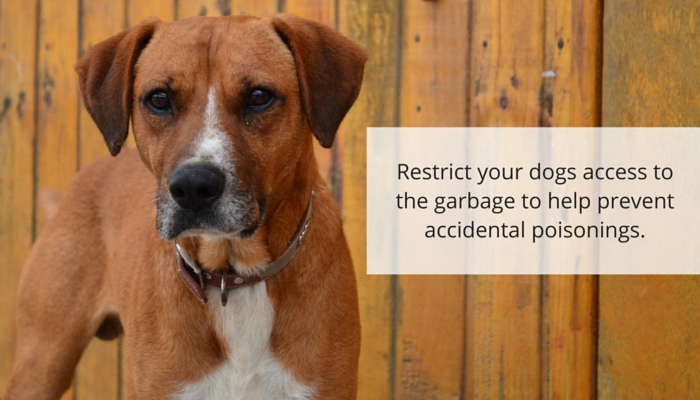
Scavenging through the garbage is one of the common ways dogs get poisoned. Use a garbage can with a lid (tied with bungee cords if necessary) or keep it under the sink.
Xylitol Poisoning Is a Medical Emergency For Dogs
If you suspect your pet has ingested xylitol contact your veterinarian immediately.
Let’s help keep our pets safe from these potential hazards in our homes. Read your labels, and keep any items that contain xylitol out of your pet’s reach (up in cabinets rather than in your purse).
You can help by spreading to the word to all your dog loving friends.
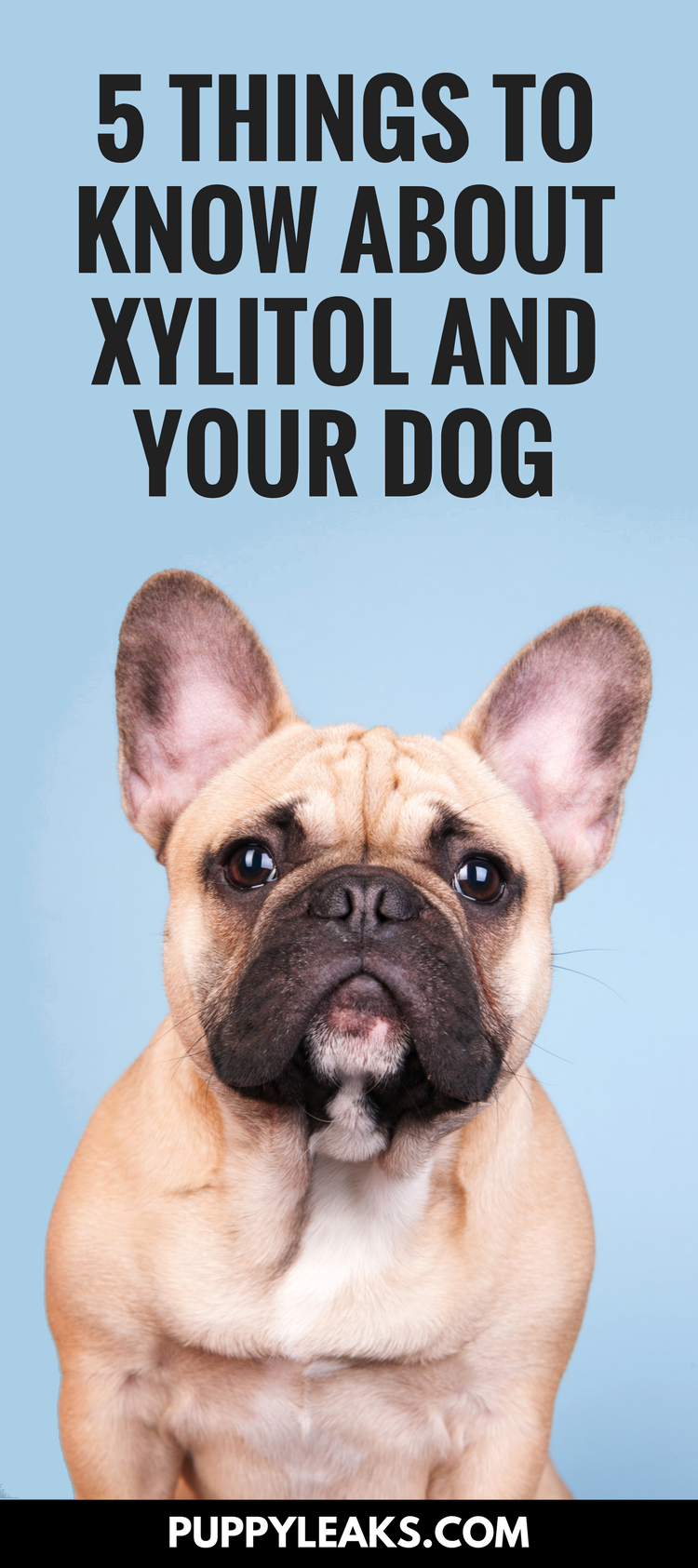
Please share with your friends


Yes, we had heard of Xylitol in gum and recently in some peanut butters. One of my worries when out and about with Archer is having him unknowingly pickup a piece of gum either off the ground or get a piece off the under side of a chair or table while eating lunch. Our friend’s guide dog pup, Winter did get into a pack of gum containing Xylitol, but fortunately our friend quickly got him to the emergency vet before Winter had any adverse effects.
I’m glad your friends dog was OK, such a scary thing to happen. Like you I’m often worried about what my dog might end up picking up when we’re out & about.
I’m hoping as more pet owners voice their concerns these companies will choose to go with another sweetener.
There are a lot of products with Xylitol. Maybe we should think about a ban on the product. It doesn’t sound like an ingredient that is good for a human’s body either. Thank you for sharing this information.
It’s actually not an artificial sweetener, it’s a sugar alcohol, which is completely natural and humans process it differently than dogs. In people, different types of sugar alcohols affect us differently. Maltitol, for instance, (commonly used in sugar-free candies) typically causes really bad intestinal upset, while Erythritol is mostly asymptomatic in people. Zylitol can cause a bit of a spike in blood sugar, so it’s not usually a number one choice for people watching carb intake carefully, but most people would agree that it tastes the most like sugar of all the sugar alcohols and doesn’t typically cause the digestive upset that maltitol can. Because of these reasons, it’s not likely to be banned for human consumption. It’s much safer for us than artificial sweeteners like sucralose or aspartame. We’re just going to have to be vigilant about keeping these products away from dogs.